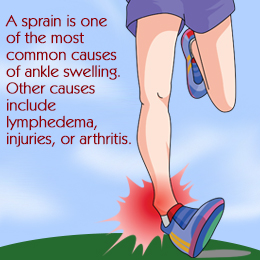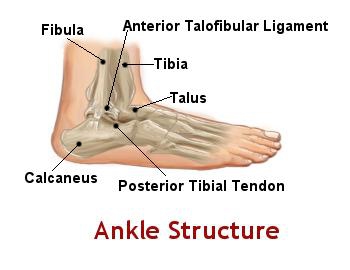Swollen ankles refer to the unnatural fluid buildup between the body cells of the ankle and feet. The causes can vary from a poor dietary habits, an infected body part, to an injury. Go through this article to find out the causes behind this swelling and the possible treatment options available.

Ankle swelling is a condition characterized by an excess of watery fluid collecting inside the ankle joint, or in the soft tissues around the ankle. In medical terms, this condition is known as
edema. Swelling of the feet and ankles is fairly common if an individual stands, sits, or walks for a prolonged period of time. In this case, with adequate rest, the swelling does subside on its own. Similarly, long distance travel can also cause swelling of feet and ankles in some individuals. Now, determining the real cause is essential for proper and effective treatment to be meted out.
Causes
If the swelling in the ankles and feet are not due to an injury, and do not subside after rest and elevation, then it could signify an underlying medical issue. A proper and thorough diagnosis by a medical professional will only help to ascertain the exact cause of swelling. The probable reasons could vary widely, from arthritis to heart disease or kidney problems, to insect bite, poor blood circulation and over-stressing of the ligaments. Let us take a look at some common causes and treatments available for swollen feet and ankles.

Ankle Tendinitis
Physically active individuals generally have this condition. An injury to the posterior tibial tendon, a tendon present on the inside part of the ankle, as shown in the above image, which is responsible for raising the arch of the foot, can cause severe pain and swelling around the ankle.
Ankle Injury
A trauma or injury like ankle sprain, broken ankle, or stress fracture can also lead to swelling around the ankle joint. The ankle sprains because the ligaments that hold the ankle in place are stretched beyond its normal range.
Arthritis
Arthritis is another cause for ankle swelling and occurs when the joints between the tibia (shinbone) and talus (ankle bone) wear out. It can be painful and is more common in patients who are overweight, have rheumatoid arthritis or have injured their ankle joint previously.
Peripheral Edema
It is a blood circulation problem that may occur in both the legs and cause chronic swelling to the ankles. Sometimes, the legs and feet swell because of excessive pressure being exerted on the varicose veins, or due to excess body weight.
Lymphedema
A blockage in the lymphatic system, prevents lymph fluid from draining and builds up or gets accumulated in the ankle joints, which causes swelling in the feet and ankle. This condition needs immediate treatment, lest the entire leg could get infected.
Pregnancy
In women, menstruation and pregnancy could cause ankles, feet, or legs to swell. Especially, during pregnancy, there could be excessive ankle swelling because of high blood pressure. It can also be a sign of
pre-eclampsia which requires immediate medical attention.
Gout
Gout is a painful inflammation of the ankle due to the accumulation of uric acid crystals within the fluid of the ankle. Uric acid is a substance produced during digestion and found in the blood and urine. Patients suffering from gout have an abnormal accumulation of uric acid crystals in their joints which causes swelling and inflammation.
Septic Arthritis
Swelling in the soft tissues surrounding the ankle joint or in the septic knee joint itself, could be a sign of an infection. It is caused by a bacterial, viral or fungal infection that spreads through the bloodstream to the joint. Consult a doctor immediately, if you notice any infected blisters and sores on your swollen foot.
Blood Clot
Blood clot is a type of vascular obstruction that occurs in the legs and causes swelling around the ankles and feet. It could prove to be dangerous if not treated in a timely manner, and cause other body parts to swell as well.
Excessive Salt Intake
Unreasonable intake of salt, alcohol, coffee, tea, soda, etc., can result in abnormal buildup of fluid in the ankle joints which causes the ankle to swell. So, lower the intake of salt and other processed or packed foods to bring down the swelling.
Side Effects of Certain Medication
Intake of medication like steroids, antidepressants, oral contraceptives, laxatives used to induce bowel movement could also cause ankles to swell. Consult your doctor if you notice swelling around the ankles or on the feet after taking any medication.
Treatments
Here are some remedies to reduce swelling and inflammation of the ankles. If the swelling turns very painful and does not subside within the next two or three days, then you must consult a doctor, immediately.
- Use leg wedges to elevate your feet while sleeping. This can help lower the pain and swelling, too.
- Applying an ice pack on the swollen area for fifteen to twenty minutes could also help reduce the swelling and pain.
- To reduce swelling, soak your swollen ankle in 3 liters of warm water mixed with a cup of Epsom salt.
- Lower the intake of sodium in your diet.
- Avoid wearing tight-fitting clothes as they can restrict blood and fluid circulation in the body leading to swollen ankles.
- Wear comfortable shoes and support stockings. Specialized shoes and elastic stockings are available online for those with ankle or foot problems.
- Walk more frequently, exercise, stretch and rotate your ankles in small circular movements. Avoid standing or sitting in one place for too long.
- Even if you suffer from arthritis, exercise is still important for strengthening the joints. Try tai chi or slow yoga, before starting any routine discuss your exercise plan with your doctor.
- On long distance travel, make sure you get up at regular intervals and walk around a little.
If there is no underlying medical cause to swelling of the ankles then the above-mentioned remedies will definitely prove helpful. Persistent pain and any unusual accompanying symptoms should be reported to the doctor immediately.
Disclaimer:
This Buzzle article is for informative purposes only, and should not be substituted for the advice of a medical professional.


 Ankle swelling is a condition characterized by an excess of watery fluid collecting inside the ankle joint, or in the soft tissues around the ankle. In medical terms, this condition is known as edema. Swelling of the feet and ankles is fairly common if an individual stands, sits, or walks for a prolonged period of time. In this case, with adequate rest, the swelling does subside on its own. Similarly, long distance travel can also cause swelling of feet and ankles in some individuals. Now, determining the real cause is essential for proper and effective treatment to be meted out.
Ankle swelling is a condition characterized by an excess of watery fluid collecting inside the ankle joint, or in the soft tissues around the ankle. In medical terms, this condition is known as edema. Swelling of the feet and ankles is fairly common if an individual stands, sits, or walks for a prolonged period of time. In this case, with adequate rest, the swelling does subside on its own. Similarly, long distance travel can also cause swelling of feet and ankles in some individuals. Now, determining the real cause is essential for proper and effective treatment to be meted out. 